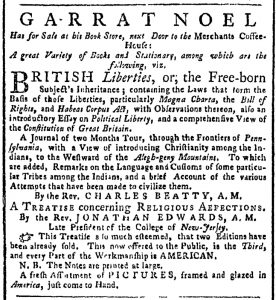What was advertised in a colonial American newspaper 250 years ago today?

“Every Part of the Workmanship is AMERICAN.”
Bookseller Garrat Noel frequently inserted advertisements in newspapers published in New York in the late 1760s. In an advertisement that appeared in the September 11, 1769, edition of the New-York Gazette or Weekly Post-Boy, he promoted a “great Variety of Books and Stationary” available at his shop, highlighting three of them that he considered of special interest to prospective customers. The first was a political tract. The title also served as an overview of its contents: “BRITISH Liberties, or, the Free-born Subject’s Inheritance; containing the Laws that form the Basis of those Liberties, particularly Magna Charta, the Bill of Rights, and Habeas Corpus Act, with Observations thereon, also an introductory Essay on y, and a comprehensive View of the Constitution of Great Britain.”
The contents of the other two books were distinctly American. A travel narrative looked westward to the “Frontiers of Pennsylvania” and the prospects of “introducing Christianity among the Indians, to the Westward of the Alegh-geny Mountains.” It included a brief ethnography, described as “Remarks on the Languages and Customs of some particular Tribes among the Indians,” while also presenting indigenous Americans as a problem to be solved. The book featured “a brief Account of the various Attempts that have been made to civilize them.” Considered together, the tract on “BRITISH Liberties” and the travel narrative told the story of an ideal North America, at least from the perspective of colonists who desired westward expansion facilitated by compliant Indians and a Parliament that knew the boundaries of its authority on that side of the Atlantic.
Noel also marketed a third edition of a “TREATISE concerning RELIGIOUS AFFECTIONS,” by Jonathan Edwards (1703-1758), the influential revivalist minister who had played a significant role in the movement now known as the Great Awakening. Not only written by an American author, “every Part of the Workmanship” of the book “is AMERICAN.” Noel began his advertisement with a political tract and returned to politics in his efforts to sell the final book he highlighted. Most of his “great Variety of Books” had likely been imported from Britain, even those by American authors, but this one had been produced in the colonies. American compositors set the type. American binders secured the pages. Noel concluded his advertisement with another nod to the “domestic manufactures” that became so popular during the nonimportation movement that colonists joined to protest the taxes levied by the Townshend Acts. He offered a “fresh Assortment of PICTURES, framed and glazed in America.” The prints themselves almost certainly came from Britain, but Noel chose to emphasize the portion of the product made locally. This achieved symmetry in his advertisement, balancing the concern for the “BRITISH Liberties” of colonists with an opportunity to defend those liberties by purchasing a book and framed prints made, all or in part, in America. As much as was possible with his current inventory, Noel invoked a “Buy American” strategy to resonate with the politics of the day.
